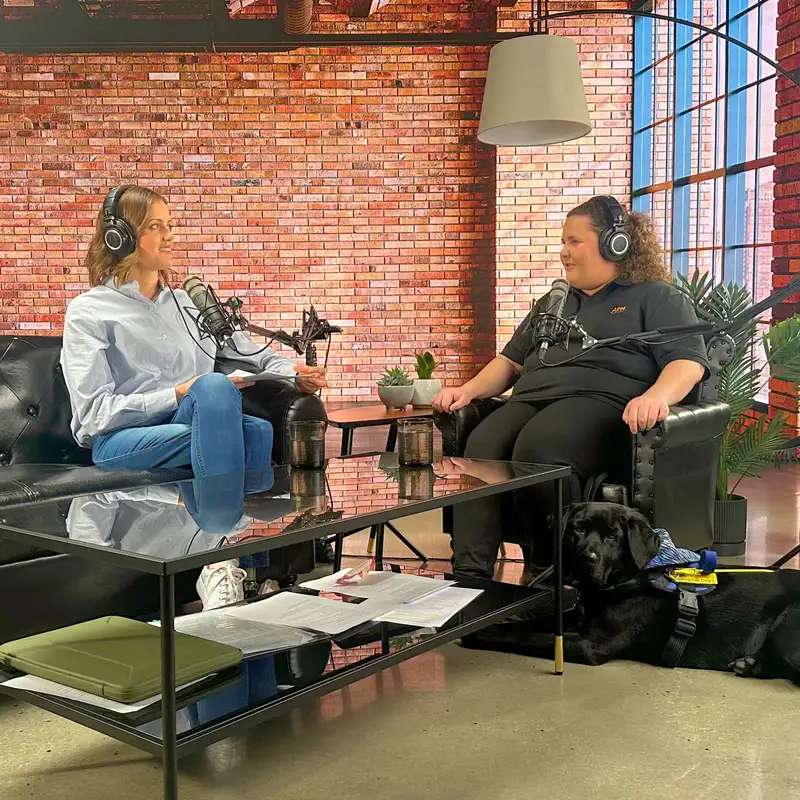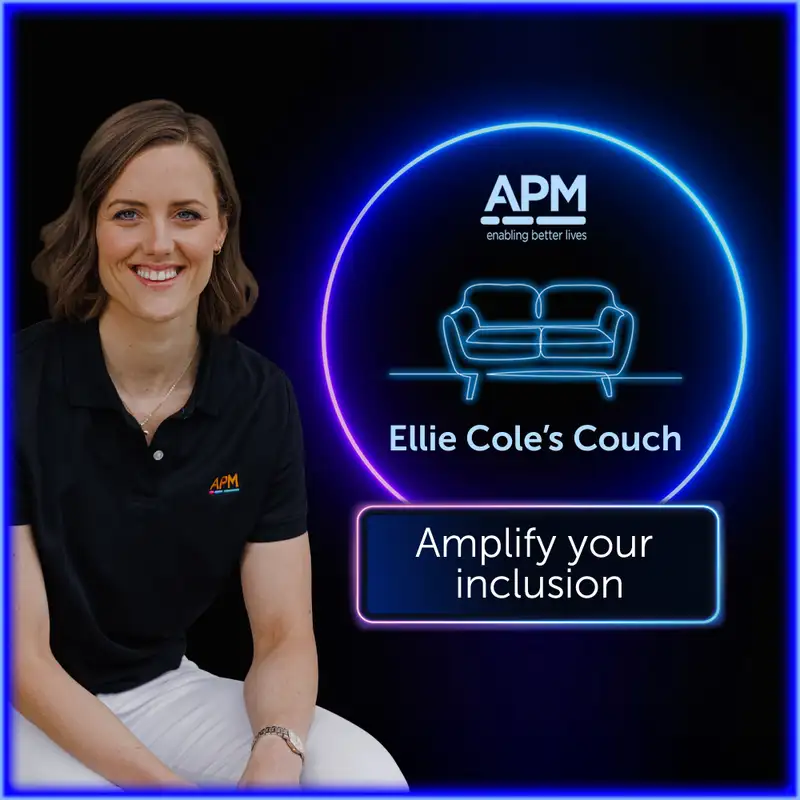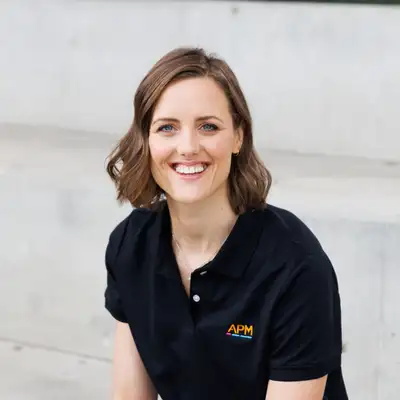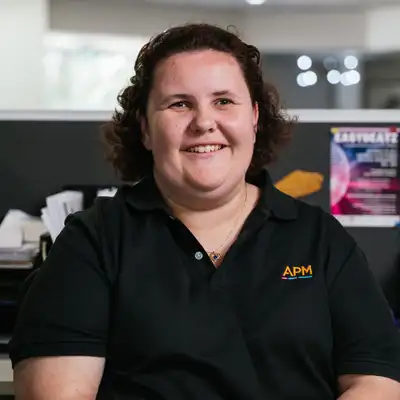Visual impairment and accessibility in the community with Ayesha Patterson
Ellie: Hi everyone,
I'm APM Ambassador Ellie Cole and today
we will be discussing visual impairment
and the vital role of accessibility in
both in employment and in everyday life.
I'm so delighted to introduce you to
today's guest Ayesha and her beautiful
seeing eye dog, Princess, and together
we're going to explore the unique barriers
faced by individuals with visual
impairments in the workplace and discuss
practical steps that employers can take
to create more inclusive environments.
We'll also touch on the importance
of community support and awareness
in making public spaces
accessible for everyone.
Ayesha, thank you so much
for joining us today
and bringing along a very special
guest as well.
Princess, who is still awake
but I don't think will be by the end,
not because of the content
of the conversation,
because it's a very relaxing
environment to be in.
Are you able to introduce your name,
your age and your role at APM?
Ayesha: So my name is Ayesha Patterson.
I'm 32 and I'm a LAC Community
Capacity Builder at APM Communities.
Ellie: Now tell us about where you grew up.
Ayesha: I grew up in Mandurah,
which is south of Perth.
Lived there my whole life
and I still live there.
It's great because you can be
close to Perth
to get to and from,
but you're not in the city.
Ellie: Yeah.
And what was it like growing up there?
Ayesha: Everyone knows everyone so,
and you kind of have that environment now,
with my work, people come in and are like “hi, Ayesha”
and they go, “how do you know that person?”
I'm like, “oh, you know went to high school with them
or, did some community work with them.”
Which is kind of cool.
Ellie: And, tell me about what it was like
going to school in Mandurah.
Did you go to a school that helped you
with your vision impairment
or what was your schooling like?
Ayesha: My schooling, I went to a private school.
But I didn't advertise
that I had disability.
I had very
good vision at the time that I thought,
but even though I could hardly see
anything,
and I just wasn't accepting of the disability,
it took me a while to accept.
So I wore magnifying glasses
because glasses were cool.
Ellie: Glasses were cool?
Ayesha: Yeah.
Ellie: That's a bit backwards
from what I grew up with.
Ayesha: I know.
And I would borrow my friend's notes
and everything
just so I could still do school and
I learned how to listen a lot.
Yeah, I didn't use any equipment
or anything until after high school.
Ellie: So it sounds like when you were growing up,
even with a disability, you really learned
how to adapt to your surroundings very,
very quickly and just to make things work.
Ayesha: Yeah.
Ellie: Yeah, I think it’s a really
amazing skill to have,
and I think a lot of people in
the communities are really starting
to identify a lot of the strengths
that people with disabilities have.
And, you know, there's so many stories
like yours where you have difficulty
navigating some things in everyday life,
but you just happen to find a way around it.
And it sounds like you had friends there
that helping you with your notes.
Ayesha: Yeah, they did, but that was my stubborn stage.
Ellie: Yeah. You mentioned before, it was
a little better when you were younger?
Ayesha: Yeah. So my vision has been getting
worse as I've gotten older.
It will lead to complete blindness.
So the condition I have,
the cells in my retina are dying.
So all the ones that are in charge
of your peripheral vision,
night vision, color, depth.
And then I have cataracts over
the top as well.
So that makes life interesting.
Ellie: I bet it does.
Do you have memory, when you were younger,
of ever being able to see clearly, or is it
something that has been degrading
since you were a young child?
Ayesha: Before I was four so one of those random circumstances,
I was bitten by a Redback (spider)
and I didn't get the anti-venom,
and it caused the eye condition.
So before that, yeah, I can remember seeing stuff.
Ellie: What was it like for you to grow up
and go to school with a disability?
You said that you were very good
at camouflaging it for a while,
but I'm sure the penny dropped eventually.
Ayesha: Oh, yes.
The penny did drop with a lot of people.
But I've just met up recently
with a school reunion, and
I turned up there with my seeing eye dog,
and they're like, really? You're blind? What?
We had no idea.
And then other people, like, yeah, we knew.
But yeah, it wasn't until after I left high school
that I would, I actually,
you know, accepted my disability
and said, stuff it, I don't care what people think.
And it was the best thing I ever did.
Ellie: Yeah, absolutely.
I think, it's really empowering
to get to that point as well.
And I heard you mentioned before that
it took you a while
to accept having a disability yourself.
Let alone sharing that information
with the rest of the world, which,
you know, you should only do so
if you feel like you're in a comfortable
and safe environment
to be able to do that.
So what was it like for you to,
take the time and digest that information
and come to terms with the fact
that you did have a disability
and come to terms
with accepting
that part of yourself as well.
Ayesha: It was the best thing I ever did.
And, you know, accepting that,
because now, like, everything
that's happened in my life is,
mainly because of
I have a disability, which is great.
It's led to lots of opportunities,
and being able to share and empower
and advocate for others has been great.
And also for myself.
Ellie: What kind of opportunities are you speaking
to you when you say that
having a disability has led
to a lot of opportunities in your life?
Ayesha: So it led to me to be able to
travel around Australia
a lot, because I got to represent
WA with sport.
Ellie: Really? You're an athlete?
Ayesha: Past. I’m injured, so I don’t do sport now.
Ellie: I can't believe you've waited 15 minutes
to tell me you're an athlete.
Ayesha: Yeah, so I used to do goalball
and then tenpin bowling.
Ellie: So how did you become involved
in the goalball team?
I know quite a few of the girls.
Ayesha: I was looking for something to do,
and a sport, something to keep me busy.
And this youth person, who’s in Blind Sports Australia, WA here.
Was like, we've got this sport,
we're looking for female people,
do you want to come and have a go?
And I went up to Perth and watched it
and I was hooked like straight away.
And then competed and represented WA
and all that from 2012 to 2015.
Ellie: Incredible.
Did you ever make the Australian team?
Ayesha: No, almost.
Ellie: And then you became injured?
Ayesha: Yeah.
Ellie: I'm not surprised to hear
that you became injured because
from my experience playing goalball
and from what I've seen, it is brutal.
Ayesha: It is.
Ellie: Absolutely brutal on your body.
Ayesha: Yeah.
At the time, there was only 4 or 5 women,
so we were competing
against the guys every training session,
which was very chaotic.
And then yeah, took up
tenpin bowling from 2016 to 2020.
Ellie: As someone who had joined an inclusive
sporting team in terms of goalball
as well as your tenpin bowling,
what was like that like for you
to be able to step into a whole new
community there based on sports?
Ayesha: It was amazing to people
to not think about disability
because we all had different disabilities.
A lot of people would forget
they actually had a disability,
which is awesome.
And then having the confidence
in your coach to be able to say
you can compete against other people,
it was really cool.
I found it really interesting.
Ellie: Just then when you said a lot of people
forget that they had a disability,
because in my experience,
I forget all the time.
It's it's fascinating
to have a difference or impairment,
and it's almost like you yourself
don't feel any differently
until someone else tells you that you are.
Ayesha: Yeah.
Ellie: And so when you step into a team
or a place that's really inclusive,
no one's telling you
that you are different.
And it can be really empowering.
Don’t you think?
Ayesha: It’s so empowering, yeah.
I find that with my role at APM as well,
being capacity builder, I'm making
sure that the community is accessible
and also people with disabilities,
they feel empowered and
I had someone come up to me last week,
they had a full conversation with me,
and they never did that before, you know,
12 months ago, which was amazing.
Ellie: Yeah, that's really nice to hear.
Now I see that you've brought
Princess along here today.
You have a seeing eye dog.
What role does Princess
play in your day-to-day life?
Ayesha: What doesn’t she do?
She's my sidekick.
Ellie: She guided you in pretty
well today.
Ayesha: Yeah. She's my eyes. Literally.
If I didn't have her,
I would be banging into stuff and,
she gives me a lot of independence
to be able to get out and about.
Ellie: What was your life
like before Princess came into your life?
What is it like now that
she's in your life?
Ayesha: So there was a gap between
the two dogs because
she's my second dog,
and I was on a waitlist for four years.
Between the two dogs
and going from full independence,
having a dog to going back to my cane,
and having to relearn how to use a cane,
and then also having my eyesight,
you know, go down
quite a lot in that space.
I noticed that I wasn't doing a lot of stuff,
what I used to do.
I would rely heavily on friends and support
just to be able to go out and about.
Ellie: Yeah. Ayesha: But now I can get on the bus
and go to the shopping centre
and meet up with a friend for a coffee, or
go up to Perth for a favourite activity,
me or my friends would go
to Fringe Festival.
So, you know, this year I was actually
able to meet her at a
really nice place and go to the theatre
which was great.
Ellie: Walking throughout your community,
accessing the communities,
what’s some of the biggest challenges
that you face, just in day-to-day living?
Ayesha: A lot of people try and pat her while I'm
giving commands or walking,
which can distract her and me.
I call them ninja patters, because
they just quickly put their
hand down and try and pat,
and then they walk off.
So yeah, me,
my friends, we call them ninja patters.
And then the other issues I have
a lot is taxis and Ubers.
Unfortunately, a lot of them refuse.
I've had some try and put the
dog in the boot of the car,
or they see the dog and they drive past,
which is it's always an ongoing
issue all over Australia, unfortunately,
refusals for taxis and Ubers.
Ellie: I've heard of a lot of experiences and,
and I've read a lot of,
I've seen a lot of media
about that as well.
About people that use seeing eye dogs
trying to access any kind of transport,
and the difficulties
that they face with that,
and that can be really challenging
and a huge barrier for people to be able
to access communities as well.
Ayesha: Yes, totally.
But buses and trains, they’re great, you know.
Ellie: Yeah.
Ayesha: Or you find a really good taxi driver like I have at home,
and he picks me up for work,
drops me off at home.
Ellie: What about some of the challenges
that you face day-to-day
just living with a vision impairment?
Ayesha: I try and not look at it as challenges,
or limitations, like limits.
But I try to come away with solutions.
But the most frustrating thing is trying to find
the right top or the right pair of shoes.
Normally I wear, multi-colored flats,
Mary Jane shoes,
and the other day, my friend goes,
you realise you're wearing
the two different shoes, and I'm like,
oh, oopsies.
Ellie: I'm sure she understands.
Ayesha: Yeah, so we've run back into the house and, you know,
we found the other shoe, but it's just hilarious.
Ellie: You know what?
I've actually done that
quite a few times myself
because I don't have a vision impairment,
but when I go to bed, I leave a shoe on my prosthetic.
And then when I was an athlete,
I used to wake up
in the middle of the night
almost to go to swimming training.
So I would get change in the dark.
So I guess it is similar.
And because I already
had a shoe on my foot, I would just grab
what I thought would be the right shoe,
and the amount of times
I went to training
with two different shoes on
because I couldn't
feel the difference in the shoes either,
one of my feet was plastic,
so it's quite common.
Ayesha: Yeah.
Ellie: What are the assumptions that people make about vision
impairments that’s the most common,
the most common things that you see
people make assumptions about?
Ayesha: I think the biggest assumption
is that they think that everyone
with vision impairment can read Braille,
and I don't,
and a lot of people in the community
actually don't read Braille.
Some a lot of people do, but not everyone.
Ellie: When you were growing up, what was it like
for you to be able to access employment?
Ayesha: Because I know in my community
where I grew up in Victoria,
everybody wanted a job at the age of 14.
And, you know, it was
pretty difficult for me to even get a job
with a physical impairment.
Ellie: For you, what was it
like trying to gain employment
when you were able to enter the workforce?
Ayesha: It was so challenging. Yeah.
It took me forever to get jobs.
And then I would have to go to TAFE,
do all the qualifications,
and then you go and try to find a job,
you put the interview in,
and then the biggest barrier was,
do you have a driver's license?



